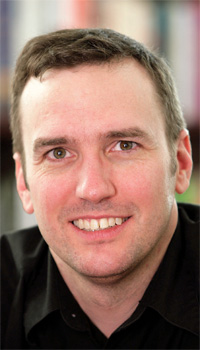 It was Bach’s B Minor Mass that hooked him.
It was Bach’s B Minor Mass that hooked him.
Charles “Chuck” Kamm ’91 had always enjoyed music. He had studied piano as a kid and sung in the madrigal singers and concert choir all through his Earlham career, but he thought of music as a hobby and assumed he would end up earning a degree in physics or history. Then, during his junior year, he met Bach. “Singing that piece was definitely a highlight for me,” says Kamm. “I thought to myself, maybe this is what I really want to do.”
Kamm gained his first experience as a choral conductor at Earlham, working with Professor of Music Dan Graves and some other students, he completed a Ford/Knight student-faculty research project on choral conducting. Each student conducted a small chamber choir of student volunteers, and Kamm took to conducting easily.
“It felt very natural to me. I was fortunate to have a gestural vocabulary from the beginning.”
Graves recalls that shortly before the concert at the end of that project, one of the students in Kamm’s ensemble objected to the lyrics of one of the pieces the group was set to perform. The song was a centuries-old madrigal which portrayed women in an unfavorable light, and the student singer did not want to perform it. “In a small choir like that, you absolutely need every voice, so Chuck had to work out how to respond to this one student while also honoring the work that he and the choir had put into that piece,” notes Graves. “I don’t remember what happened, but Chuck found a solution. I think it was a good learning experience for him and the other student.”
After Earlham, Kamm earned a Master of Music degree at Michigan State University. He later earned Master of Musical Arts and Doctor of Musical Arts degrees from Yale University. He is currently assistant professor of music history and director of choirs in the joint music program at the Claremont Colleges in California. He has previously taught at Vassar College and the University of Massachusetts at Boston and prepared choirs at Harvard University, at Yale University, for Finnish National Radio, for the Classical Music Festival in Eisenstadt, Austria and at Xiamen University in China.
Kamm spent the spring semester of this year on sabbatical in Finland, where the Earlhamite reached him by telephone. In an interview he was soft spoken but passionate as he described the role of choral singing in the context of a liberal arts education.
“Choral music touches on the core of our humanity,” he says. “Music is part of what sets us apart from other species, the preparation for performing involves studying literature, poetry and history…”
“This type of singing requires a group of people to find common ground,” he notes. “It involves many of the true strengths of how to live as a human like listening and collaboration. Each person contributes what they have, and the resulting sound is more beautiful that what any one person could create.”
Kamm’s time away from campus is allowing him to devote more time and energy than usual to his work as a soloist. A tenor and countertenor with a passion for performing, Kamm has performed the Evangelist role in Bach’s St. John Passion as well as works by such composers as Samuel Barber and Franz Schubert. Past performances as a soloist range from Mozart’s Requiem to Monteverdi’s Vespers to the role of the Madwoman in Benjamin Britten’s chamber opera Curlew River.
He credits his career direction in large part to the ease with which students can try new things at Earlham.
“I had never sung in a choir before I came to Earlham,” he recalls. “When I did, I just fell in love.”
Reprinted with permission from the Summer 2009 edition of the Earlhamite.

